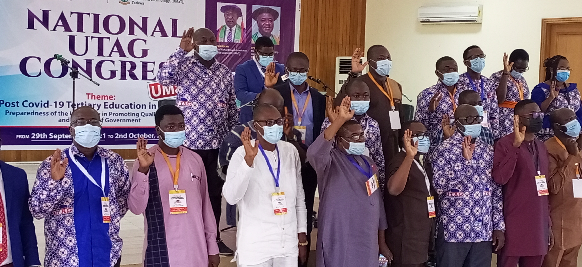
Respect agreements - UTAG to govt
The new National President of the University Teachers Association of Ghana (UTAG), Prof. Solomon Nunoo, has called on the government and its assigns to respect the various agreements they have signed with labour to maintain industrial harmony.
Speaking at the 2021 (20th) UTAG biennial national delegates congress and induction of new officers at the University of Mines and Technology (UMat), in Tarkwa, he said present negotiations on conditions of service must end at some point, saying the current ‘Makola-tactic’ of negotiating with UTAG adopted by the government was appalling.
Research allowances
After his induction, Prof. Nunoo will work with other UTAG national officers – Vice-President Dr. Eric N. Wiah, Secretary Dr. Asare Asante-Annor and Dr. Akyene Tetteh, Treasurer.
He said as of 1st October, 2021, book and research allowances (BRA) were still pending, a situation which had led to the question being asked on university campuses: “Where is the BRA?”
Prof. Nunoo said “to maintain industrial harmony, the government should urgently pay the BRA and quickly attend to all the pending issues for some peace to prevail”.
The spine
Ten years ago, he said, when he first joined the National Executive Committee of UTAG as the National Secretary, “we were at the crossroads; with a section of the members asking for enrolment onto the Single Spine Salary Structure (SSSS), whereas others were apprehensive about the policy”.
“Today, we are on the ‘spine’, with its attendant challenges. The challenges have resulted in our engagement with our employer with the quest to improve on the conditions of service of UTAG members.
“Regrettably, the engagement has not yielded the expected results that we were all anticipating at the start of the engagements, resulting in the strike in August 2021,” he said.
The one-month window
Having failed to conclude the negotiations within the one-month window after the suspension of the strike on August 23, 2021, he said, UTAG found itself at the crossroads again.
On UTAG, Prof. Nunoo said at present the dream of building a national secretariat for UTAG, which had been on the drawing board for the past 12 years, was still pending.
“The previous NEC, led by the President, Prof. Charles Ofosu Marfo, has made some gains and it is up to us to continue to build on the foundations they have laid,” he said.
He said negotiating non-payroll allowances with the governing councils of the various public universities had also been pending, among others.
Call for unity
He said in the face of all those challenges and the move to give members better conditions of service, the time had come for unity, with one mindset.
“We need to stay focused on our ultimate goal of improving the working conditions of our members,” he said.
For his part, the Pro-Vice-Chancellor of UMaT, Prof. Anthony Simons, who spoke on the topic: “Challenges of Single Spine Salary Structure: The Case of the University Teacher”, said in its quest to have fairer public sector pay policy, the country had practised a number of pay structures in the past century.
Historical precedent
That, he said, had always been done with the view of improving efficiency and effectiveness in the public sector, which saw several pay structures, such as the Guggisberg Appointed Committee (1927), the Harragin Commission (1945-1946), the Mills-Odoi Commission (1967), the Issifu Ali Committee (1973), the Justice Azu-Crabbe Commission (1979), the National Committee for Wages and Salary Rationalisation (1983), the Gyampoh Commission (1992-1993) and the Ghana Universal Salary Structure (GUSS) in 1999.
He said, however, that GUSS, like the ones before it, could not stand the test of time and workers in the public sector started complaining about the inequalities that it was fraught with.
Prof. Simons said the current state of the salary levels of university teachers was problematic and that it required urgent attention.
Emoluments report
“The present salary disparity between articles 71 and 190 office holders is too wide and efforts must be made to close the gap, as recommended in the Prof. Yaa Ntiamoah-Baidu Presidential Committee on Emoluments Report,” he said.
He said in order to safeguard the health of the SSSS, the employer should consider the removal of university teachers from it as a matter of urgency.
“If the employer considers the health of the SSSS not to be an option, then the government should urgently complete the labour market survey (LMS) and compensate university teachers appropriately to help attract and retain qualified staff,” he said.
Prof. Simons urged UTAG to continue to be proactive and remain resolute at the negotiating table, saying: “At all times, remember to consider the plight of the general membership in every deliberation with the employer.”
He, however, cautioned members “not to go to sleep, as in the past” when success came.
There were fraternal messages from sister associations.
There was also a presentation by Prof. John Gyapong, Vice-Chancellor of the University of Health and Allied Sciences, on the impact of the COVID-19 pandemic on university education, with focus on the threats and opportunities.
